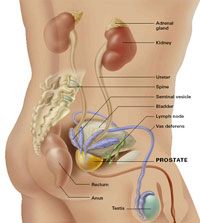Scientists: sex hormones has no association with prostate cancer
By Margarita Snegireva. Researchers found out that the level of sex hormones in the blood has no connection with the risk of prostate cancer.

A collaborative analysis of 18 prospective studies deflated the hypothesis that prostate cancer is driven by endogenous sex hormones, according to Andrew Roddam, D.Phil., of the University of Oxford , and colleagues.
"Circulating concentrations of androgens or estradiol do not appear to be associated with the risk of prostate cancer," Dr. Roddam and colleagues concluded online in the Journal of the National Cancer Institute .
The specific causes of prostate cancer remain unknown. A man's risk of developing prostate cancer is related to his age, genetics, race, diet, lifestyle, medications, and other factors. The primary risk factor is age. Prostate cancer is uncommon in men less than 45, but becomes more common with advancing age. The average age at the time of diagnosis is 70. However, many men never know they have prostate cancer. Autopsy studies of Chinese, German, Israeli, Jamaican, Swedish, and Ugandan men who died of other causes have found prostate cancer in thirty percent of men in their 50s, and in eighty percent of men in their 70s. In the year 2005 in the United States, there were an estimated 230,000 new cases of prostate cancer and 30,000 deaths due to prostate cancer.
A man's genetic background contributes to his risk of developing prostate cancer. This is suggested by an increased incidence of prostate cancer found in certain racial groups, in identical twins of men with prostate cancer, and in men with certain genes. In the United States, prostate cancer more commonly affects black men than white or Hispanic men, and is also more deadly in black men. Men who have a brother or father with prostate cancer have twice the usual risk of developing prostate cancer. Studies of twins in Scandinavia suggest that forty percent of prostate cancer risk can be explained by inherited factors. However, no single gene is responsible for prostate cancer; many different genes have been implicated. Two genes (BRCA1 and BRCA2) that are important risk factors for ovarian cancer and breast cancer in women have also been implicated in prostate cancer.
Subscribe to Pravda.Ru Telegram channel, Facebook, RSS!


